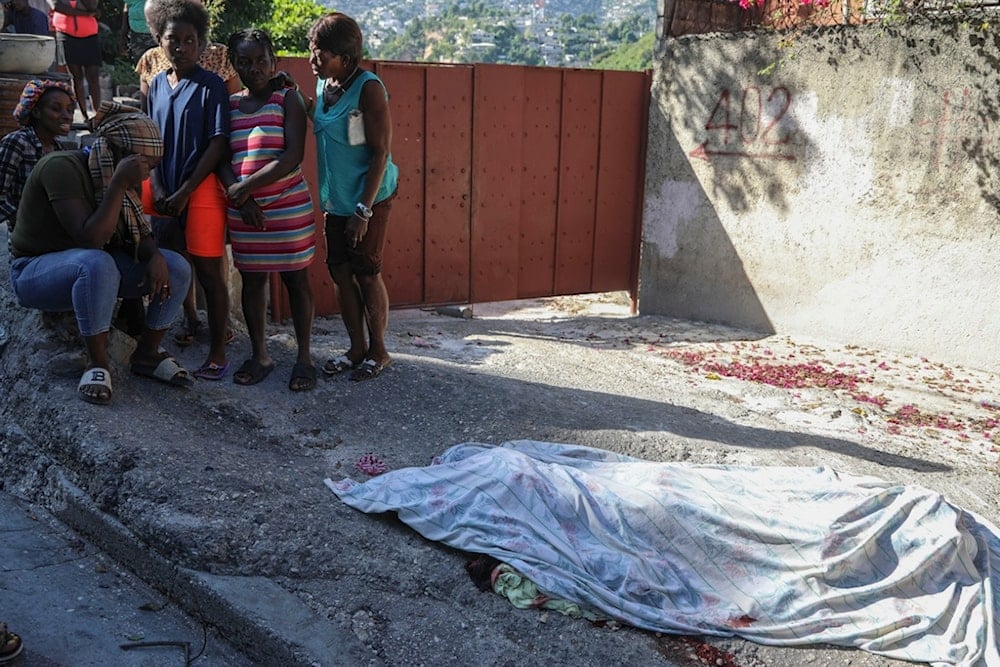Haitian gang leader 'Barbecue' flees police operation
Haitian gang leader Barbecue has managed to escape the police after they carried out an operation targeting him in the country's capital.
-

Residents gather before a person killed in an attack by gang members, in the Pétion-Ville neighborhood of Port-au-Prince, Haiti, Tuesday, November 19, 2024 (AP)
One of Haiti's most notorious gang leaders, Jimmy Cherisier, also known as "Barbecue", escaped a police operation in the capital that left two of his close associates dead, Haitian authorities said Friday.
The leader of the Viv Ansanm gang alliance released a video statement acknowledging a clash with police but provided no further details. Haitian police confirmed that Cherisier fled the scene, abandoning a rifle, which they later displayed on social media.
The confrontation occurred in Cherisier's stronghold of Bas de Delmas and resulted in multiple fatalities among gang members, including two of his inner circle.
Haiti's ongoing struggle with gang violence has intensified since February, when armed groups launched coordinated attacks in Port-au-Prince, declaring their intent to oust then-Prime Minister Ariel Henry.
Henry resigned in April and was succeeded by Garry Conille, who was dismissed earlier this month by the Presidential Transitional Council (CPT). Alix Didier Fils-Aime, the current prime minister, has pledged to restore order and conduct national elections, the first since 2016.
Gangs now control an estimated 80% of Port-au-Prince, frequently targeting civilians despite the presence of a Kenya-led multinational security mission deployed earlier this year.
The violence has taken a heavy toll on the population. Since November 11, at least 150 people have been killed in the capital, and over 20,000 residents have been displaced, according to United Nations figures.
The UN estimates that at least 4,544 people have been killed due to gang violence across the country in 2024 alone.
In a separate incident on Tuesday, authorities reported that 28 gang members were killed in clashes involving police and civilian defense groups.
Kidnappings and sexual violence continue to afflict communities, displacing over 700,000 people, half of whom are children, according to the International Organization for Migration.
The crisis worsened last week when the United States suspended all civilian flights to Haiti for a month after three airplanes near Port-au-Prince were struck by gunfire, cutting off a vital link for the country, further isolating it from the outside world and intensifying the difficulties faced by its residents.
Prime environment for violence
Since the beginning of October, gangs have been focusing their efforts on multiple districts in Port-au-Prince, with attacks persisting in Solino. Gangs attacked a school in L'Estere, which led to the death of a parent and injuries to several children.
According to a report from Human Rights Watch (HRW), Haitian armed gangs are also enlisting starving children to strengthen their ranks in preparation for a prolonged and violent clash with international security forces.
The rights organization stated that the armed groups, which dominate much of Haiti, are luring hundreds, if not thousands, of impoverished children to join their ranks with promises of food and shelter.
HRW reports that as many as 30% of Haitian gang members are now children who have been coerced into illegal activities, serving as armed soldiers, spies, or being exploited for sexual purposes.
Earlier in October, a gang assault on Pont-Sonde resulted in at least 109 fatalities and over 40 injuries. Meanwhile, powerful gangs control 80% of Port-au-Prince and the major roads in the country.

 3 Min Read
3 Min Read








